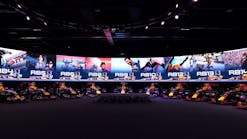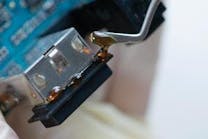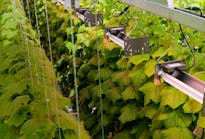Wageningen University & Research and Tencent Announce 3rd International Autonomous Greenhouse Challenge
Wageningen University & Research and Tencent are proud to announce the 3rd edition of the International Autonomous Greenhouse Challenge. Multidisciplinary teams from around the world will use artificial intelligence to remotely produce lettuce. The goal of the third challenge – to be held between June 2021 and June 2022 - will be a fully automated and controlled greenhouse without human interference. Potential participants are invited to visit the website www.autonomousgreenhouses.com for more information and pre-registration.
Wageningen University & Research (WUR) is ranked as the world’s best agricultural university and works, among other things, on autonomous greenhouses, climate control, crop modelling, the use of sensors, data, intelligence, computer vision and robotics. Tencent is the sixth largest publicly traded company worldwide. It’s mission is to enhance the quality of human life through Internet services.
Connecting AI and food production
By organizing the Autonomous Greenhouse Challenge, WUR and Tencent want to connect the world of artificial intelligence (AI) and food production, create more knowledge, make this knowledge publicly available and thus contribute to the worldwide efforts of making our food systems more sustainable. The ever-growing world population gives rise to an increased demand for fresh and healthy food. Autonomous greenhouses and remote digital farming can help feed more people with vitamin and mineral rich produces, increase food security and produce more vegetables with fewer resources such as water and energy.
Tomatoes, cucumber and lettuce
The first two editions of the Autonomous Greenhouse Challenge were organised in 2018 and 2019/20 at the WUR-facilities for Greenhouse Horticulture in Bleiswijk and centred around growing a cucumber crop and a cherry tomato crop. Both competitions showed that artificial intelligence can potentially outperform skilled growers in economically growing of crops, hence can potentially control indoor farming in the future. However, in former editions all teams were still using humans in their decision-making. The goal of the third challenge will be a fully automated control without human interference.
Third edition
The first part of the third edition of the Autonomous Greenhouse Challenge already starts in summer with an open Online Challenge, aiming at testing machine learning and computer vision skills of potential participants and raising broad interest in the AI community. The second part of the competition starts with a Hackathon, in which the 5 best teams will be selected during a 24-hour virtual greenhouse lettuce crop production contest at the end of autumn. The highlight will be the Greenhouse Challenge in which these 5 teams will compete in a real greenhouse lettuce production with fully automated control during the first half of 2022.
The final goal of the challenge will be to produce a full 6-8 weeks lettuce crop cycle with high quality, high resource efficiency and high revenue without human intervention during the growing period in greenhouses of WUR, the Netherlands, fully autonomously. Teams can show their AI skills during the Online Challenge, exercise in virtual lettuce growing during the Hackathon and in a real lettuce growing during a first crop cycle. The second real crop cycle determines the winner. The final winner will be the team with the highest net profit at the end. The public will be able to follow the result of the contest online.
Who can join?
The Online Challenge is targeting AI experts with skills in machine learning and computer vision. It is not necessary to participate in the Online Challenge before participating in the Hackathon and Greenhouse Challenge. However, it is advisable since we scout talents, the winner gets a wild card directly for the Greenhouse Challenge and there will be a price to win for the Online Challenge.
For the Hackathon and Greenhouse Challenge teams must consist of experts with a proven background in different fields such as artificial intelligence, sensor technology, crop physiology and horticultural production. Companies and start-ups are invited as well as scientists and students. Teams must include at least 3 members. At least one team member must be a student. We encourage teams from all countries to participate.
Registration for the Online Challenge will be opened in April 2021. Registration for the Hackathon and Greenhouse Challenge will be opened in July 2021.
Potential participants can find more information on admission requirements and preregistration at www.autonomousgreenhouses.com.
Focusing on the mission ‘To explore the potential of nature to improve the quality of life’, Wageningen University & Research (WUR) combines fundamental and applied knowledge in order to contribute to resolving important questions in the domain of healthy food and living environment. Over 6,500 employees (over 5,500 fte) and more than 12,000 students are inspired by nature, society, and technology and tackle the issues with an open and curious perspective. This inspiration has enabled WUR to be amazed, develop knowledge, and apply this knowledge internationally for over a century. We collaborate with governments, companies, non-governmental organisations and other research institutes.
Contact:
Silke Hemming - Head, Scientific Research Team
Greenhouse Technology
WUR





